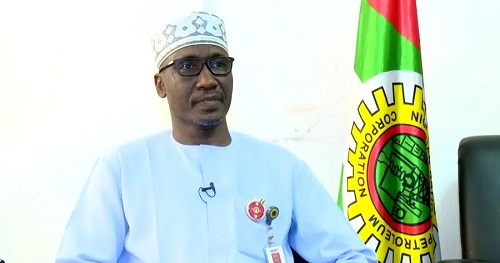This post has already been read 632 times!
The Group Managing Director, GMD of the Nigerian National Petroleum Corporation Limited, NNPCL, Mr. Mele Kyari, said yesterday that N3.4 trillion could only subsidize 66.7 million litres of fuel.
Kyari disclosed this when he appeared at the resumed hearing of the ad hoc committee of the House of Representatives investigating subsidy regime from 2013 to date, chaired by Ibrahim Mustapha.
It will be recalled that over N4 trillion annually was budgeted and spent on fuel subsidy in Nigeria. Kyari, who was represented by the Chief Financial Officer of the company, Mr. Umar Ajia, put the daily consumption rate of Premium Motor Spirit, PMS, or petrol, at 100 litres.
According to him, the landing cost of PMS currently stands at N327.68 per litre.
He said: “We have about 1.6 billion litres incoming, land and marine. This is what is the minimum level we have to maintain, especially as we approach winter.
“Even gas that is transition fuel for us is being given an 8 years. Of course, we do not agree. When you look at PMS outlook, we want to be closing each and every month with a two billion closing stock.
‘’That is the only way you can sustain petroleum so that the marketers do not see some slack and take advantage by beginning to hoard product that can create artificial scarcity which can lead to queues.
“There is a huge arbitrage for anybody to move product to outside. We are not saying that bulk of the product is smuggled. The reality is that there is no study to validate the actual consumption. What we are reporting daily is what the authority, which is the regulator publishes. They are represented at every depot in Nigeria.
“Exchange rate has been moving steadily from N195.5 per dollar to now N390.6 to a dollar, on average. The subsidy scheme is two ways, the FX subsidy and price. “The shipping cost has doubled. Therefore, the landing cost of PMS has moved from N87 per litre in 2015 to about N327.68 per litre today. When you compare it to what we sell, you have N209 on every litre.
‘’When you multiply the N209 per litre with an average of 66.7 million litre, you are talking about N3.4 trillion subsidy for the year.
“The reality today is that if one were to take statistic of the number of vehicles in Nigeria, how many Keke Napep do we have? How many pumping machines do we have? On a routine visit, I saw nothing less than a million keke, take an average that, each one uses 4 litres every day, that is 4 million litres, in one city.
“States that consume the most are states like Oyo and Ogun, they even consume more than Lagos State, so you wonder, is it that they have more vehicle than Lagos? This explains that these are states with porous borders and that will explain why this bulk evacuation is going out of Oyo and Ogun states, probably neighboring countries.”
Kyari, who also bemoaned the failure of acquilla installation to checkmate illegal transportation of fuel from the border communities said Nigeria was inadvertently subsidizing fuel for her neighboring countries.
He was, however, responding to the committee’s enquiry as to why the border communities were getting more supplies.
“If you have N5 million, you can cross the borders with trucks laden with PMS and that is the bitter truth. We have porous borders; yes we have Customs but I do not know.
“PMS crosses everywhere, to Cameroon through the North East, Nigerian PMS gets to Mali. Our neighbouring countries hardly import PMS; in fact, some of them do not have the cover to back up imports.
“Cameroon’s refinery got burnt sometime last year or so, since that time, they have not imported PSM but they are still using PMS. if you go to Niger, you find that PMS is sold in bottles.
“To them, it is a cheaper source, why waste their foreign exchange, so we are subsidizing our neighbours, that is the simple truth,” he said
The GMD also said the Direct Sales Direct Purchase, DSDP, contract scheduled to end in August, had been suspended to avoid the scarcity in December and during the 2023 general elections.
He said: “It is very dangerous period to begin to pretend that because we are facing the winter, these are the difficult “embers months” that we normally avoid fuel scarcity.
“You know the scarcity in Nigeria is really associated with Christmas period, so if you now tender, the tendering process will take one or two months. So what the Board approved we do is to extend the contract for six month, such



